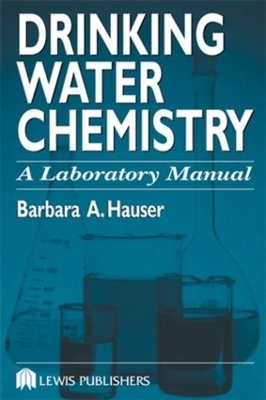
Drinking Water Chemistry
A Laboratory Manual
Seiten
2001
Crc Press Inc (Verlag)
978-1-56670-486-1 (ISBN)
Crc Press Inc (Verlag)
978-1-56670-486-1 (ISBN)
Covers the performance and troubleshooting of water chemistry analysis and application of the results to the determination of water quality before and after treatment. This book provides the employee with an understanding of the analyses performed in the potable water lab.
Whether you are a new employee or seasoned professional you need easy access to the latest test methods, updated quality control procedures, and calculations at your fingertips. You need to perform analyses quickly and easily and troubleshoot problems as they arise. You need a resource that is not only informative, but also practical and easy to use. Drinking Water Chemistry: A Laboratory Manual fills this need.
The book gives you a thorough overview of the most basic, and therefore important, laboratory topics such as:
Laboratory Safety - dos and don'ts based on real experience
Sampling - preservation techniques, online sampling, and record keeping
Laboratory Instruments - practical use ranges, principles of operation, calibration, conditioning, useful life and replacement, common quality control issues
Chemical Use - reagents, standards, indicators, purpose and use, chemical quality and properties, avoidance of contamination, molecular weight calculations
Quality Control - replicate analyses, spiked, split, and reference samples, percent recovery of standard, standard deviation, control charts, and everyday quality control measures
Weights and Concentrations - care and analytical balances, mathematical conversions among concentration units, dilutions and concentration changes
The remaining chapters cover test analysis including: reason for the test, type of sample taken, treatment plant control significance, expected range of results, appropriate quality control procedures, apparatus used, reagents, including function, concentration and instructions for preparation, procedural steps, calculations and notes on possible problems, and references.
This is a working manual, meant to be kept by your side in the lab, not on the shelf in an office or library. You can bend it, you can lay it flat, you can take it anywhere you do your job. Useful and practical Drinking Water Chemistry: A Laboratory Manual provides the information you need to perform tests, understand the results, apply them to the determination of water quality before and after treatment, and troubleshoot any problems.
Whether you are a new employee or seasoned professional you need easy access to the latest test methods, updated quality control procedures, and calculations at your fingertips. You need to perform analyses quickly and easily and troubleshoot problems as they arise. You need a resource that is not only informative, but also practical and easy to use. Drinking Water Chemistry: A Laboratory Manual fills this need.
The book gives you a thorough overview of the most basic, and therefore important, laboratory topics such as:
Laboratory Safety - dos and don'ts based on real experience
Sampling - preservation techniques, online sampling, and record keeping
Laboratory Instruments - practical use ranges, principles of operation, calibration, conditioning, useful life and replacement, common quality control issues
Chemical Use - reagents, standards, indicators, purpose and use, chemical quality and properties, avoidance of contamination, molecular weight calculations
Quality Control - replicate analyses, spiked, split, and reference samples, percent recovery of standard, standard deviation, control charts, and everyday quality control measures
Weights and Concentrations - care and analytical balances, mathematical conversions among concentration units, dilutions and concentration changes
The remaining chapters cover test analysis including: reason for the test, type of sample taken, treatment plant control significance, expected range of results, appropriate quality control procedures, apparatus used, reagents, including function, concentration and instructions for preparation, procedural steps, calculations and notes on possible problems, and references.
This is a working manual, meant to be kept by your side in the lab, not on the shelf in an office or library. You can bend it, you can lay it flat, you can take it anywhere you do your job. Useful and practical Drinking Water Chemistry: A Laboratory Manual provides the information you need to perform tests, understand the results, apply them to the determination of water quality before and after treatment, and troubleshoot any problems.
Hauser, Barbara
Sampling. Laboratory Safety. Weights, Volumes, and Concentrations. Laboratory Chemicals . Laboratory Instruments. Quality Assurance and Control. Total Alkalinity. Total Hardness. Acidity. Water Softening. Turbidity. Chemical Dosage: Jar Testing. Chlorine Residual. Chlorine Demand. Chloride. Specific Conductance. Langelier Index. Color. Odor. Fluoride. Sulfate. Dissolved Oxygen. Solids. Phosphorus. Atomic Absorption Spectrometry. Appendices.
| Erscheint lt. Verlag | 21.8.2001 |
|---|---|
| Zusatzinfo | 8 Tables, black and white |
| Verlagsort | Bosa Roca |
| Sprache | englisch |
| Maße | 156 x 234 mm |
| Gewicht | 318 g |
| Themenwelt | Naturwissenschaften ► Biologie |
| Technik ► Bauwesen | |
| Technik ► Umwelttechnik / Biotechnologie | |
| ISBN-10 | 1-56670-486-3 / 1566704863 |
| ISBN-13 | 978-1-56670-486-1 / 9781566704861 |
| Zustand | Neuware |
| Haben Sie eine Frage zum Produkt? |
Mehr entdecken
aus dem Bereich
aus dem Bereich
was Mikroben, Tiere und Pflanzen eint und wie sie uns ernähren
Buch | Softcover (2024)
Lenos (Verlag)
CHF 31,95
was wir alle wissen sollten
Buch | Softcover (2023)
Mitteldeutscher Verlag
CHF 33,55


